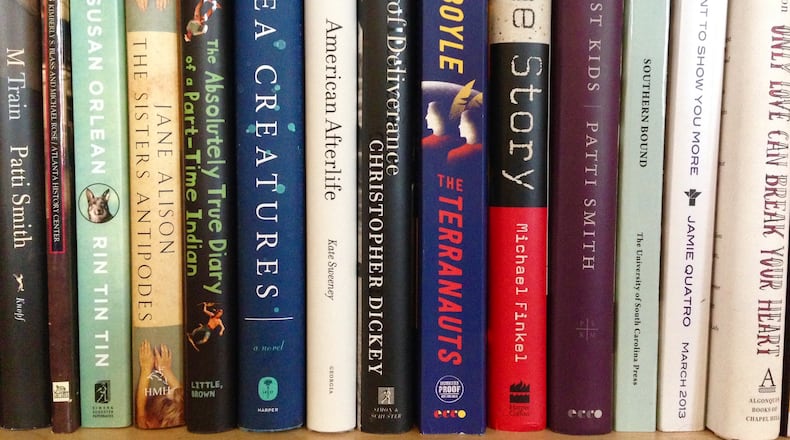When it hits, grief can make us strangers to ourselves. We do and think things we once considered inconceivable. Love does the same thing, and so often love and grief are intertwined. We grieve someone’s death, after all, usually because we love them so much.
So, what happens when grief and love strike at once? Leesa Cross-Smith explores this wild, unwieldy terrain in her new novel, "Whiskey & Ribbons."
Cross-Smith plunges in with the first line. “My husband Eamon was shot and killed in the line of duty while I was sleeping,” says Evangeline Royce. “I was nine months pregnant with our son Noah.” Eamon Royce, a Louisville, Kentucky, police officer, never gets to know his son beyond the pulse Eamon feels on his palms as he presses on Evangeline’s belly.
We feel Evangeline’s loss deeply, as the novel is partly told through her voice. In a way, we also feel Eamon’s grief, since “Whiskey & Ribbons” also carries his perspective, telling us his version of their courtship, marriage and burgeoning parenthood. He writes letters to his unborn son, and Cross-Smith allows us to glimpse brief excerpts that show both Eamon’s deep love for his wife and child, and his anxiety about his dangerous job. It’s not foreshadowing, exactly, as we already know that Eamon will be a kind of ghost haunting this novel. Still, as Evangeline says early, “Eamon’s voice is in our bedroom again and I am shattered and grief-heavy. I change the tea-stained sheets and feel the lifting.”
The lifting. Evangeline is slowly leaving her grief and moving into the next phase of her life, because she’s finding new, raw, steamy-hot love, and she doesn’t know what to do with it. She’s falling in love with Dalton Berkeley-Royce, Eamon’s brother by adoption, who loves her right back. Eamon and Dalton were as close as were Eamon and Evangeline, though without romantic intent. Dalton loves her, her son, and her dead husband, so he’s quivering with grief and uncertainty. We see the novel through his eyes, too, so that Eamon, Evangeline and Dalton form a triptych of alternating perspectives that propel the novel.
Cross-Smith beautifully conveys the anxious, conflicting intimacies of love, whether familial, romantic or erotic. Six months after Eamon’s death, all these forms of love converge on Evangeline and Dalton during the three-day period in which the novel takes place. They are snowed in by a blizzard blanketing Louisville. Noah is safe, being cared for by Eamon’s parents. But Evangeline and Eamon are stuck at home, in the house that Evangeline shared with Eamon, memories of whom practically pulses on the walls.
The place also vibrates with Evangeline and Dalton’s blossoming love for each other, which they’re understandably nervous about facing. Dalton is juggling a complicated romantic life with two other women, both very different from Evangeline, both vividly drawn by Cross-Smith, and neither one particularly happy about his living in Evangeline’s house or acting as Noah’s surrogate father. Still, Evangeline and Dalton kiss ferociously: “It was a hot, dripping wax seal. The kiss was a lock and a key. The kiss was a creaky gate in the wind.”
Throughout “Whiskey & Ribbons,” Cross-Smith’s language is pungent, tactile and mysterious — she is especially good at evoking smells, how they make us feel and how they evoke memory. She recognizes that feelings are clusters, sometimes stacking up on top of each other when we’re grieving and desiring. She conjoins conflicting adjectives with hyphens to reflect the internal wars of her characters, and how some things just can’t be described cleanly.
Cross-Smith is so specific with these concatenations — Dalton describes his suicidal mother’s laugh as “Christmas-tree-light-in-a-dark-room bright,” a perfect image for how he sees her rare moments of joy — that it’s surprising what she hides from view. Eamon and Evangeline’s honeymoon sex, with first-time jitters for Evangeline, is goosebump-raising without any physical details whatsoever. Private jokes and gestures between couples are allowed to remain ultimately hidden from the reader.
Cross-Smith hides more from us. Almost everyone in “Whiskey & Ribbons” is either black or biracial, but race isn’t a defining characteristic here, and some racial identities are left ambiguous. The sense of place is also oddly absent. Though this all happens in Louisville, there’s little sense of its regional slang, geography, landmarks or distinctions between neighborhoods. Cross-Smith’s Louisville is effectively Anytown, U.S.A.
Cross-Smith seems uninterested in writing a Kentucky novel, or a Southern novel, much less a black Southern novel. “Whiskey & Ribbons” is precise to the point of pointillism on emotions, on how memory shapes us, and on how relationships evolve. But there’s little sense of the world outside of this family. I don’t know who they vote for, what their religious domination is, or how their neighborhood is laid out. We know almost nothing about Evangeline’s parents, even though a third of the story is told from her point-of-view. Cross-Smith is curiously vague about why Eamon became a cop, and what he loves about it, and why he’s tense about the possibility of leaving police work behind.
At the end of “Whiskey & Ribbons,” the snow begins to melt, and the characters emerge into the sunlight. They’re weary, wavering and blinking but ready for love and life and light from the outside to flood their souls. Cross-Smith so strongly conveys what’s inside them that I wish she would let us see more of that outside light, and how it shines on the world beyond themselves. Nevertheless, with “Whiskey & Ribbons,” she’s created a glow, bright and throbbing.
FICTION
‘Whiskey & Ribbons’
by Leesa Cross-Smith
Hub City Press
264 pages, $27
About the Author
Keep Reading
The Latest
Featured





